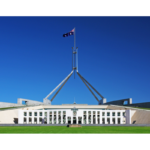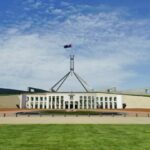Minimising the Risk of Unfair Prejudice in Jury Trials

In the eyes of many, the relentless adverse publicity against the man accused of sexually assaulting Brittany Higgins in Parliament House, Canberra on 22/23 March 2019 has made it impossible for him to ever receive a fair trial.
Mr Lehrmann was charged last year with one count of sexual intercourse without consent, a criminal offence punishable in the Australian Capital Territory by up to 12 years’ imprisonment.
Ms Higgins complaint sparked March 4 Justice rallies around the country, a fierce social debate about violence against women, and a string of internal investigations and reviews within Parliament house and its associated workplaces.
The public has been encouraged to accept her claims as truth – all-but doing away with the presumption of innocence, the fundamental principle that a person must be considered innocent until and unless he or she is found to be guilty in a court of law.
Wilkinson, Jones and Keller
It is common knowledge that Channel 10 presenter Lisa Wilkinson made comments supportive of Higgins during her speech on 19 June 2022 while accepting the Silver Logie for her reporting of the complainant’s allegation of having been sexually assaulted by Mr Lehrmann.
The speech was made just days before Mr Lehrmann’s trial was scheduled to commence and in circumstances where the media generally, and Wilkinson specifically (who was scheduled to appear as a witness) were warned in a pre-trial conference on 15 June 2022 not to make such comments.
The very next morning, WSFM radio presenters Brendan Jones and Amanda Keller heaped praise on Ms Wilkinson for her speech during their popular radio show.
Trial vacated (cancelled)
Referring to Ms Wilkinson’s speech, ACT Chief Justice Lucy McCallum remarked:
“Ms Wilkinson… openly referred to and praised the complainant in the present trial”.
“The distinction between an untested allegation and the fact of guilt has been lost”.
Her Honour vacated the trial “regrettably and with gritted teeth” and a new trial date of 4 October 2022 was set.
Application for permanent stay of proceedings
Two days later on 21 June 2022, Mr Lehrmann’s criminal defence lawyers made an application to the court for a ‘permanent stay of proceedings’ (a permanent cancellation of the case) on grounds of the obvious – that their client will never be able to have a fair trial given the amount of adverse reporting against him.
That application was ultimately refused.
For their interference with the administration of justice, Wilkinson, Jones and Keller were asked to enter undertakings not to repeat their conduct, rather than charged with contempt of court.
Stays of proceedings
An application for a stay of proceedings may be made to temporarily put a case on hold (a temporary stay of proceedings) or permanently halt proceedings (a permanent stay of proceedings) in circumstances where unfairly prejudicial reporting makes it impossible for a defendant to receive a fair trial.
In New South Wales, the court’s power to issue a stay of proceedings is found in section 67 of the Civil Procedure Act 2005.
Stay orders can be made unconditionally or on conditions set out by the court, and the grounds on which a stay application can be made include, but are not limited to:
- Where there has been an abuse of process,
- Where the court is clearly an inappropriate forum for the proceedings,
- Where the parties are awaiting the determination of relevant proceedings in another court or tribunal,
- Where there are concurrent criminal proceedings in the same jurisdiction,
- To consolidate other proceedings into the one proceeding,
- Where there are parallel proceedings in different jurisdictions,
- Where proceedings would be a waste of costs,
- Where an agreement has been made to arbitrate or mediate a civil matter,
- Where there was a failure to pay legal costs in a civil matter which involved essentially the same claim,
- Where a failure to pay legal costs of dismissed proceedings involved essentially the same claim,
- Where a party failed to comply with a court or medical timetable, or to answer interrogatories,
- Where there was a significant delay between the events giving rise to the cause of action and the commencement of proceedings, which delay has resulted in relevant evidence becoming unavailable or impoverished, and
- Where it is demonstrated on the balance of probabilities that a fair trial would not be possible in the circumstances, such as where the defendant’s oral evidence went to a critical aspect but he or she is now unable to give evidence due, for example, to incapacity.
Suppression and non-publication orders
Another way to protect against unfair prejudice caused by adverse reporting is through suppression and non-publication orders.
Section 3 of the Court Suppression and Non-Publication Orders Act 2010 (‘the Act’) defines a suppression order as one that prohibits or restricts the disclosure of information, by publication or otherwise.
The section defines a non-publication order as one that prohibits or restricts the publication of information, but does not otherwise prohibit or restrict the disclosure of information.
When can a suppression or non-publication order be made?
Section 8(1) of the Act provides that such an order can be made where:
(a) it is necessary to prevent prejudice to the proper administration of justice,
(b) it is necessary to prevent prejudice to the interests of the Commonwealth or a State or Territory in relation to national or international security,
(c) it is necessary to protect the safety of any person,
(d) the order is necessary to avoid causing undue distress or embarrassment to a party to or witness in criminal proceedings involving an offence of a sexual nature, or
(e) it is otherwise necessary in the public interest for the order to be made and that public interest significantly outweighs the public interest in open justice.
Subsection 8(2) of the Act makes clear that any such order “must specify the ground or grounds upon which the order is made”, while 8(3) provides that an order can be made “to avoid causing undue distress or embarrassment to a defendant in criminal proceedings involving an offence of a sexual nature only of there are exceptional circumstances”.
Contravening a suppression or non-publication order is a crime
Contravening a non-publication order is an offence under section 16 of the Act, which carries a maximum penalty of 12 months in prison and/or a $110,000 fine.
The maximum fine for a corporation is a $550,000.
Media organisations fined
In the high-profile case of George Pell, media coverage was heavily restricted by the courts.
Pell faced two trials so the verdict in the first trial was suppressed, in order to ensure a fair second trial. George Pell was eventually acquitted of all charges against him.
The media companies found to have ignored the suppression order were subsequently fined by the Supreme Court: The Age was fined $450,000, news.com.au was fined $400,000 and the Today Show copped a $30,000 fine.
Judge-alone trials
Another way that courts can deal with high profile trials is by ordering a judge-alone trial.
The idea is that judges, unlike jurors, are trained not to consider information that is outside the confines of the trial itself and are therefore less likely to be influenced by unfairly prejudicial reporting.
It should be said, however, that this option is not available in the nation’s capital for trials involving allegations of sexual assault. Such trials must be heard by a jury.
In New South Wales
In New South Wales, amendments to the Criminal Procedure Act 1986 (NSW)(the Act) in 1990 enabled trials by judge alone in respect of state offences where the prosecution consented.
The Act was further amended in 2011 to enable defendants to apply for such trials in the absence of consent.
The relevant rules are now contained in sections 132, 132A and 133 of the Act.
Section 132 provides that a defendant or prosecutor may apply for a District or Supreme Court trial to be tried by a judge alone – which is referred to as a ‘trial by judge order’.
The section says that upon such an application being made, the court:
- Must make such the order if both parties agree,
- Cannot make the order if the defendant disagrees,
- May make the order if the prosecution disagrees if it is in the interests of justice to do so,
- May refuse to make the order if the trial will involve a factual that requires the application of objective community standards, such as reasonableness, negligence, indecency, obscenity or dangerousness,
- Must refuse to make the order unless satisfied the defendant has sought and received advice about such orders from an Australian lawyer, and
- May make the order despite any of the above if there is a substantial risk a jury trial may lead to an offence of interfering with jurors, witnesses or judges under sections 320 to 326 of the Crimes Act 1900 (NSW),and that risk cannot be mitigated.
Section 132A requires that an application under section 132 for criminal proceedings must be made at least 28 days before the trial date, except with the leave (permission) of the court.
It further provides that an application must not be made in a joint trial – meaning a trial with more than one defendant – unless all defendants apply and each application is made in respect of all offences being tried.
Section 133 empowers a judge sitting alone in criminal proceedings to make findings of fact, which is normally the responsibility of the jury. It requires the judge to include the applied principles of law and findings of fact in any judgement, and to take into account any warnings that would normally be given to the jury.
‘Objective Community Standards’
The provision in section 132 that the court may refuse a judge alone application by a defendant if the case involves the application of ‘objective community standards’ has been the subject of judicial interpretation.
Some situations are relatively straightforward, such as offences which contain essential elements embodying reasonableness, indecency or offensiveness. Others are less clear-cut, such as those involving questions of credibility and intent.
In the 2008 High Court case of AK v State of Western Australia Heydon J provided the following guidance:
“Examples of factual issues requiring the application of “objective community standards” include whether behaviour was “threatening, abusive or insulting”; whether conduct was “dishonest”… whether an assault is “indecent”; and whether an accused person had a particular intention.”
The 2008 NSWCC case of R v Belghar involved a family altercation at a shopping centre whereby one family member was charged with attempted murder and attempting to inflict grievous bodily harm with intent. Chief Justice McLelland found in that case that the facts did not require the application of community standards.
Making an application
An application under section 132(1) is made by completing and filing NSW Supreme Court Form 74AJ
The application is an interlocutory decision, the refusal of which may be appealed under section 5F of the Criminal Appeal Act 1912.
Chris Dawson is facing a judge-only trial after being charged with the murder of his wife. Lynette Dawson disappeared mysteriously in 1982.
Since then, there has been a lot of media publicity around the case, books have been published and there was an Apple podcast which was taken down last year when it was clear that Mr Dawson could face charges.
Juror misconduct
Where there is a trial, the defendant’s guilt or innocence is meant to be decided solely on the evidence admitted before the jury.
For that reason, judges will invariably direct jurors not to make independent inquiries about the case they are charged with deciding.
But with instant access to information through search engines and the proliferation of social media, the potential for this direction to be breached is greater than ever.
To dissuade jurors from making such independent inquiries, section 68C of the Jury Act 1977 (NSW) prescribes a maximum penalty of 5 years in prison and/or a $5,500 fine for jurors who make an inquiry for the purpose of obtaining information about an accused, or any matters relevant to a trial, except in the proper exercise of a juror’s function is an offence under
The offence applies to a juror from the time the juror is sworn in until he or she, or the jury of which he or she is a member, is discharged by the court.
‘Making an enquiry’ encompasses:
(a) asking a question of any person, including a spouse or family member who is not a juror,
(b) conducting any research, for example, by searching an electronic database for information (such as by using the Internet),
(c) viewing or inspecting any place or object,
(d) conducting an experiment, or
(e) causing someone else to make an inquiry.
The offence further covers anything done by a juror in contravention of a judge’s direction/s.
It does not prohibit a juror from making an enquiry:
(a) of the court, or of another member of the jury, in the proper exercise of his or her functions as a juror, or
(b) that is authorised by the court.






